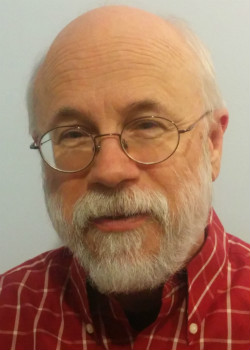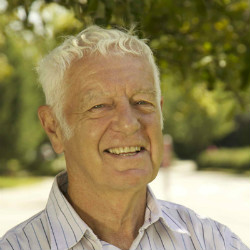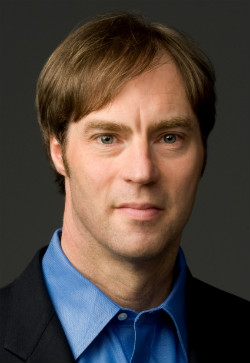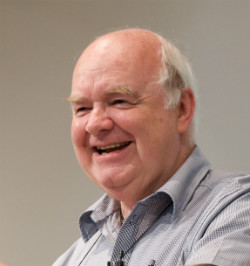The Design Iconoclasts: Behe, Denton, Meyer and Lennox
 It was Michael Behe’s excellent article in our August 2014 newsletter – carried also on this website - which reminded me of the crucial significance of Michael Denton’s 1986 book Evolution – a Theory in Crisis.[1] I didn’t read it until some considerable time after I purchased it, but when I did, it had the same effect on me as on Michael Behe. He describes his reaction to it in the documentary Unlocking the Mystery of Life[2] as akin to anger because he had simply accepted unquestioningly the Neo-Darwinian consensus. Why, he asks perceptively, did no-one in his training in the biological sciences ever mention any of the inadequacies of evolutionary theory. His subsequent books, Darwin’s Black Box[3] and The Edge of Evolution[4] are products of his reappraisal of that theory.
It was Michael Behe’s excellent article in our August 2014 newsletter – carried also on this website - which reminded me of the crucial significance of Michael Denton’s 1986 book Evolution – a Theory in Crisis.[1] I didn’t read it until some considerable time after I purchased it, but when I did, it had the same effect on me as on Michael Behe. He describes his reaction to it in the documentary Unlocking the Mystery of Life[2] as akin to anger because he had simply accepted unquestioningly the Neo-Darwinian consensus. Why, he asks perceptively, did no-one in his training in the biological sciences ever mention any of the inadequacies of evolutionary theory. His subsequent books, Darwin’s Black Box[3] and The Edge of Evolution[4] are products of his reappraisal of that theory.
Denton’s criticisms of Darwin are devastating. Drawing only from scientific data in areas such as homology, the fossil record and molecular biochemistry, he concludes that ‘the origin of new beings on earth is still as enigmatic as when Darwin set sail on the Beagle’.[5] And here is a particularly penetrating criticism of the current Darwin lobby:
 Neither Darwin, Dawkins nor any other biologist has ever calculated the probability of a random search finding in the finite time available the sorts of complex systems which are so ubiquitous in nature. Even today we have no way of rigorously estimating the probability or degree of isolation of even one functional protein. It is surely a little premature to claim that random processes could have assembled mosquitoes and elephants when we still have to determine the actual probability of the discovery by chance of one single functional protein molecule! [6]
Neither Darwin, Dawkins nor any other biologist has ever calculated the probability of a random search finding in the finite time available the sorts of complex systems which are so ubiquitous in nature. Even today we have no way of rigorously estimating the probability or degree of isolation of even one functional protein. It is surely a little premature to claim that random processes could have assembled mosquitoes and elephants when we still have to determine the actual probability of the discovery by chance of one single functional protein molecule! [6]
Interestingly, Michael Denton has published a second volume Evolution: Still a Theory in Crisis[7] updating and expanding on his earlier misgivings about evolution. It too is worth reading!
 At a Scientists in Congregations event in Glasgow in 2014, I listened to Dr Stephen Meyer, Director of the Discovery Institute’s Centre for Science and Culture in Seattle, in a Simulcast streamed from the USA, take the argument a stage further. Not only did he challenge the coherence of the over-arching Darwinian theory by arguing from Darwin’s own misgivings[8], but he elaborated on the evidence for Intelligent Design from the integrated complexity of the living cell and the sophistication of its information processing systems.[9]
At a Scientists in Congregations event in Glasgow in 2014, I listened to Dr Stephen Meyer, Director of the Discovery Institute’s Centre for Science and Culture in Seattle, in a Simulcast streamed from the USA, take the argument a stage further. Not only did he challenge the coherence of the over-arching Darwinian theory by arguing from Darwin’s own misgivings[8], but he elaborated on the evidence for Intelligent Design from the integrated complexity of the living cell and the sophistication of its information processing systems.[9]
 At the same event, Prof John Lennox of Oxford,[10] arguing from science, philosophy and theology, added a trenchant criticism of the absurdities of evolutionary reductionism. In the context of how worldviews can affect our interpretation of empirical data, his most memorable quote was
At the same event, Prof John Lennox of Oxford,[10] arguing from science, philosophy and theology, added a trenchant criticism of the absurdities of evolutionary reductionism. In the context of how worldviews can affect our interpretation of empirical data, his most memorable quote was
Theism is said to be a refuge for those who are afraid of the dark. I say atheism is a refuge for those who are afraid of the light!
References
[1] Michael Denton, Evolution: A Theory in Crisis, Adler and Adler, 1986
[2] Unlocking the Mystery of Life, DVD, Illustra Media, 2002
[3] Darwin’s Black Box, Simon and Schuster, 1996
[4] The Edge of Evolution, Free Press, 2007
[5] Denton, p359
[6] Denton p324
[7] Evolution: Still a Theory in Crisis, Discovery Institute Press, 2016
[8] See for example, Darwin’s Doubt, HarperOne, 2013
[9] See for example, Signature in the cell, HarperOne, 2009
[10] See for example, God’s Undertaker, Has science buried God?, Lion, 2009
Image credits:
Thumbnail - composite image, copyright as listed below.
Michael Behe - © Michael Behe
Michael Denton - © Discovery Institute
Stephen Meyer - © Discovery Institute
John Lennox - © John Cairns